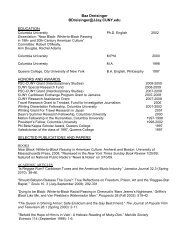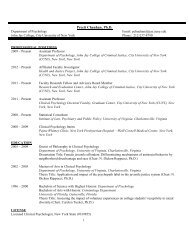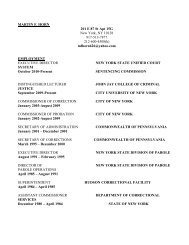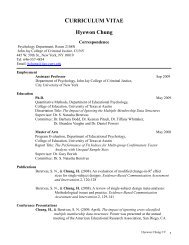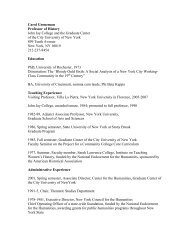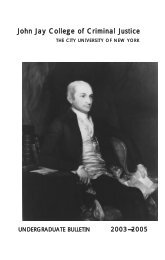Bulletin - John Jay College Of Criminal Justice - CUNY
Bulletin - John Jay College Of Criminal Justice - CUNY
Bulletin - John Jay College Of Criminal Justice - CUNY
You also want an ePaper? Increase the reach of your titles
YUMPU automatically turns print PDFs into web optimized ePapers that Google loves.
APPENDIX<br />
Informal Complaint Procedures<br />
Individuals are encouraged to discuss and/or to report, any acts felt to<br />
be discriminatory in nature directly to the Affirmative Action <strong>Of</strong>ficer.<br />
Subsequent to the filing of a written complaint, all attempts will be<br />
made to resolve the issue informally within ten (10) working days,<br />
with the goal of reaching a solution satisfactory to both the<br />
complainant and the <strong>College</strong>.<br />
The City University <strong>Of</strong> New York Student Complaint<br />
Procedure:<br />
Resolved, That the procedures for handling student complaints about faculty<br />
conduct in formal academic settings be adopted, effective February 1, 2007.<br />
Explanation: Although the University and its <strong>College</strong>s have a variety of<br />
procedures for dealing with student related issues, those procedures generally<br />
have not covered student complaints about faculty conduct in the classroom or<br />
other formal academic settings. The University respects the academic freedom<br />
of the faculty and will not interfere with it as it relates to the content or style<br />
of teaching activities. At the same time, however, the University recognizes its<br />
responsibility to establish procedures for addressing student complaints about<br />
faculty conduct that is not protected by academic freedom and not addressed<br />
in other procedures. The proposed procedures will accomplish this goal.<br />
Procedures for Handling Student Complaints About<br />
Faculty Conduct in Academic Settings<br />
I. Introduction. The University and its <strong>College</strong>s have a variety of<br />
procedures for dealing with student-related issues, including grade<br />
appeals, academic integrity violations, student discipline, disclosure of<br />
student records, student elections, sexual harassment complaints,<br />
disability accommodations, and discrimination. One area not generally<br />
covered by other procedures concerns student complaints about faculty<br />
conduct in the classroom or other formal academic settings. The<br />
University respects the academic freedom of the faculty and will not<br />
interfere with it as it relates to the content or style of teaching activities.<br />
Indeed, academic freedom is and should be of paramount importance. At<br />
the same time the University recognizes its responsibility to provide<br />
students with a procedure for addressing complaints about faculty<br />
treatment of students that are not protected by academic freedom and are<br />
not covered by other procedures. Examples might include incompetent or<br />
inefficient service, neglect of duty, physical or mental incapacity and<br />
conduct unbecoming a member of the staff.<br />
II. Determination of Appropriate Procedure. If students have any<br />
question about the applicable procedure to follow for a particular<br />
complaint, they should consult with the chief student affairs officer. In<br />
particular, the chief student affairs officer should advise a student if some<br />
other procedure is applicable to the type of complaint the student has.<br />
III. Informal Resolution. Students are encouraged to attempt to resolve<br />
complaints informally with the faculty member or to seek the assistance<br />
of the department chairperson or campus ombudsman to facilitate<br />
informal resolution.<br />
IV. Formal Complaint. If the student does not pursue informal<br />
resolution, or if informal resolution is unsuccessful, the student may file a<br />
written complaint with the department chairperson or, if the chairperson<br />
is the subject of the complaint, with the academic dean or a senior faculty<br />
member designated by the college president. (This person will be referred<br />
to below as the Fact Finder.)<br />
A. The complaint shall be filed within 30 calendar days of the<br />
alleged conduct unless there is good cause shown for delay,<br />
including but not limited to delay caused by an attempt at informal<br />
resolution. The complaint shall be as specific as possible in<br />
describing the conduct complained of.<br />
B. The Fact Finder shall promptly send a copy to the faculty<br />
member about whom the complaint is made, along with a letter<br />
stating that the filing of the complaint does not imply that any<br />
wrongdoing has occurred and that a faculty member must not<br />
retaliate in any way against a student for having made a complaint.<br />
If either the student or the faculty member has reason to believe<br />
that the department chairperson may be biased or otherwise unable<br />
to deal with the complaint in a fair and objective manner, he or she<br />
may submit to the academic dean or the senior faculty member<br />
designated by the college president a written request stating the<br />
reasons for that belief; if the request appears to have merit, that<br />
person may, in his or her sole discretion, replace the department<br />
chairperson as the Fact Finder.<br />
C. The Fact Finder shall meet with the complaining student and<br />
faculty member, either separately or together, to discuss the<br />
complaint and to try to resolve it. The Fact Finder may seek the<br />
298



